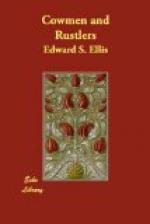“All of which is mighty interesting to the captain and myself,” remarked Sterry, with little evidence of fear; “but we will hope for better things.”
CHAPTER XXV.
THE FLAG OF TRUCE.
In one important respect the combatants showed commendable discretion. Although there had been considerable firing on the part of the rustlers, none of the cattlemen were hurt. It is not unlikely that the bullets were intended to frighten them, since such excellent marksmen otherwise could not have discharged their weapons without execution.
Capt. Asbury and his men had not returned a shot. When their enemies appeared on more than one side of the building it would have been easy to pick off several without risk to those sheltered within the house, but he gave orders that nothing of that sort should be done.
The bitterness between the parties was already intense. There were hot-heads on both sides eager to open the lamentable conflict, but were it done, there was no saying where it would end. It was wise, therefore, that the leaders forbore from active hostilities at this early stage of the business.
From the front of the structure the plain stretched in the direction of the Big Horn Mountains. It was across this that Jennie Whitney descried, two days before, the return of her friends with the body of her father. She now ascended to the second story and peered long and frequently in the same direction, in the hope of catching sight of her brother.
Meanwhile Capt. Asbury disposed of the members of his party as best he could. They needed no instructions from him to avoid in every way possible annoying the ladies, who were considerate and kind.
About midday, excitement was caused among the besieged by the appearance of a flag of truce. A man rode over the ridge, down which the cattlemen had come in such haste, holding a white handkerchief fluttering over his head. His horse walked slowly and the rider kept his gaze on the front of the house, as though in doubt of the reception awaiting him. A hundred feet away he came to a halt, still flourishing the peace signal above his hat.
Capt. Asbury was the first to discover the messenger and hurriedly arranged for the interview.
“Inasmuch as that fellow is neither Inman, Cadmus, nor anyone of the leaders, it is not the thing for me to meet him.”
“You have recognized him?” was the inquiring remark of Hawkridge, glancing with a smile at the officer.
“No. Who is he?”
“Duke Vesey, who does not feel particularly amiable toward you.”
“I will meet him,” volunteered Monteith Sterry. The captain shook his head.
“While that fellow is friendly to you, perhaps, others of the company are very resentful; it isn’t best to tempt them. Hawkridge, you are the best one to act.”
“Very well; I will do so.”




